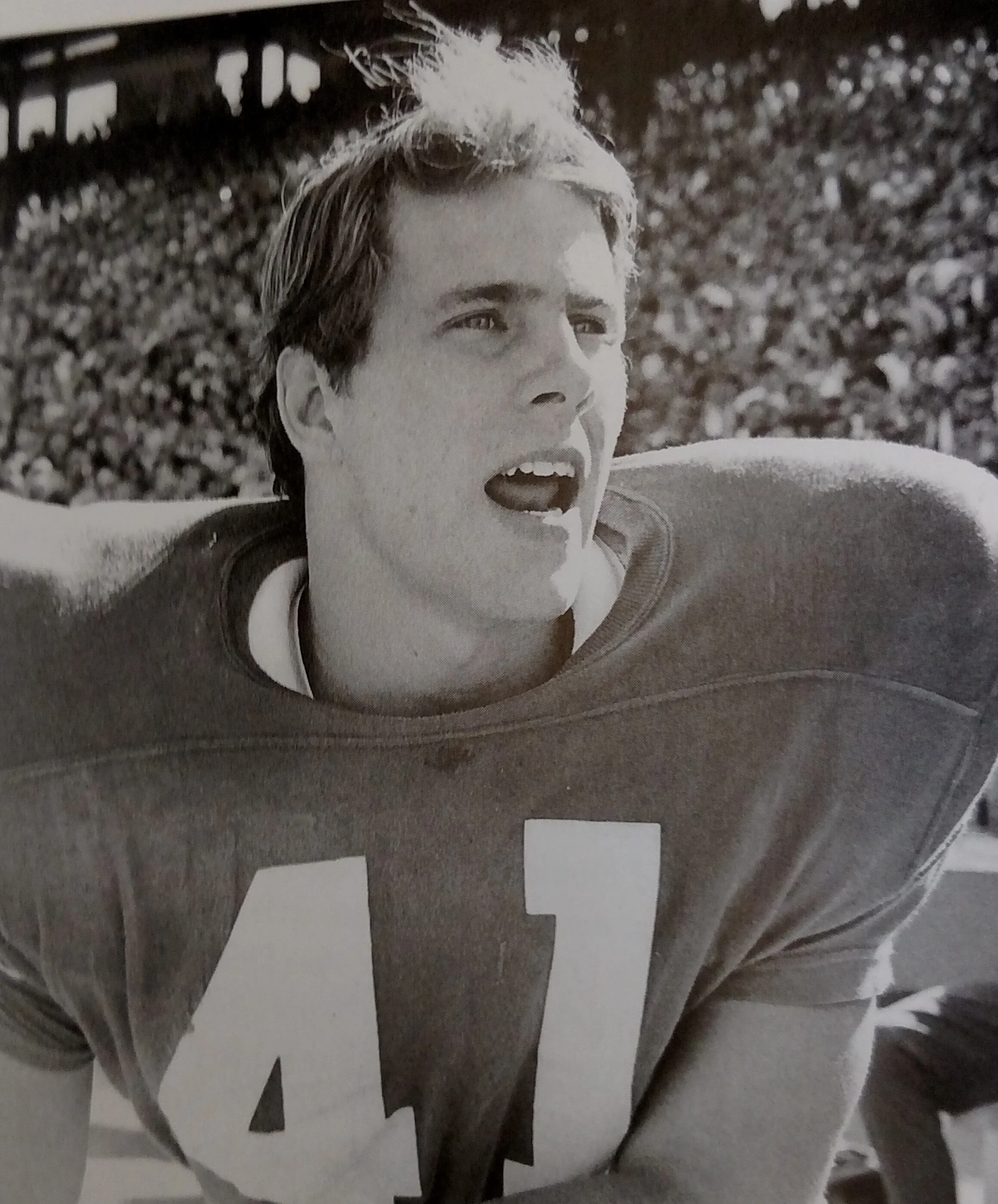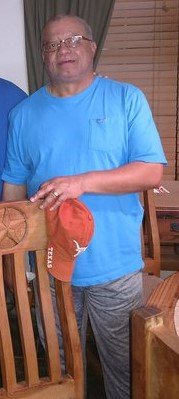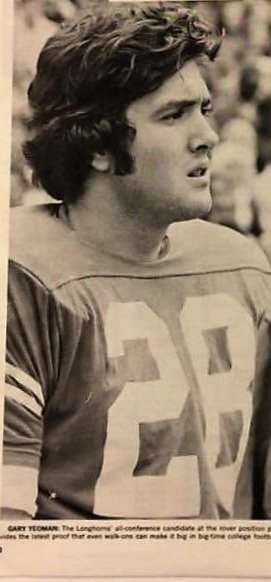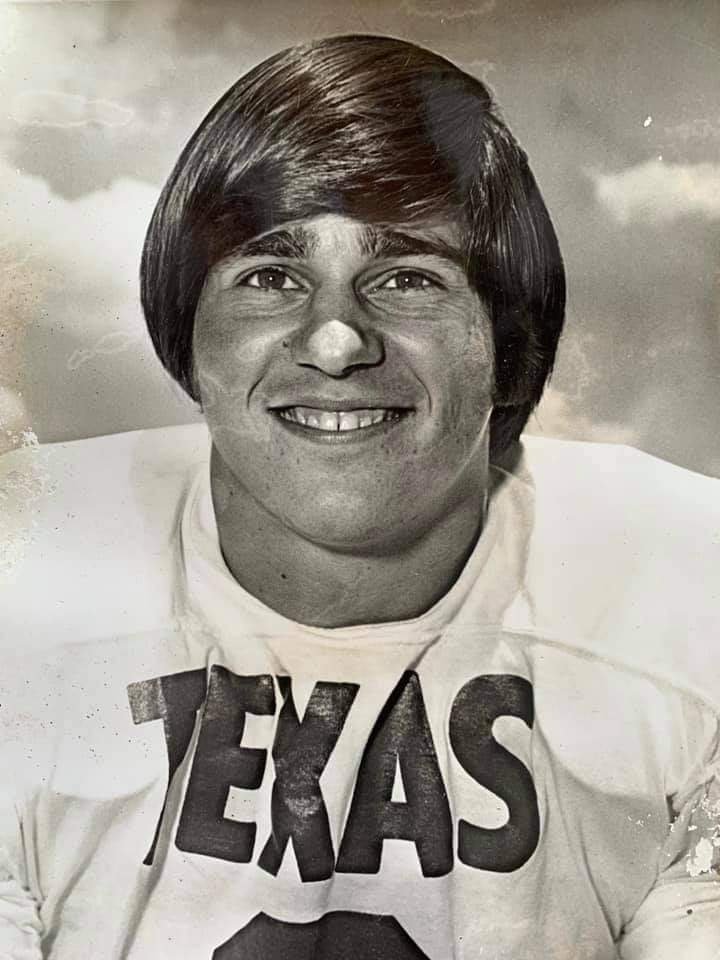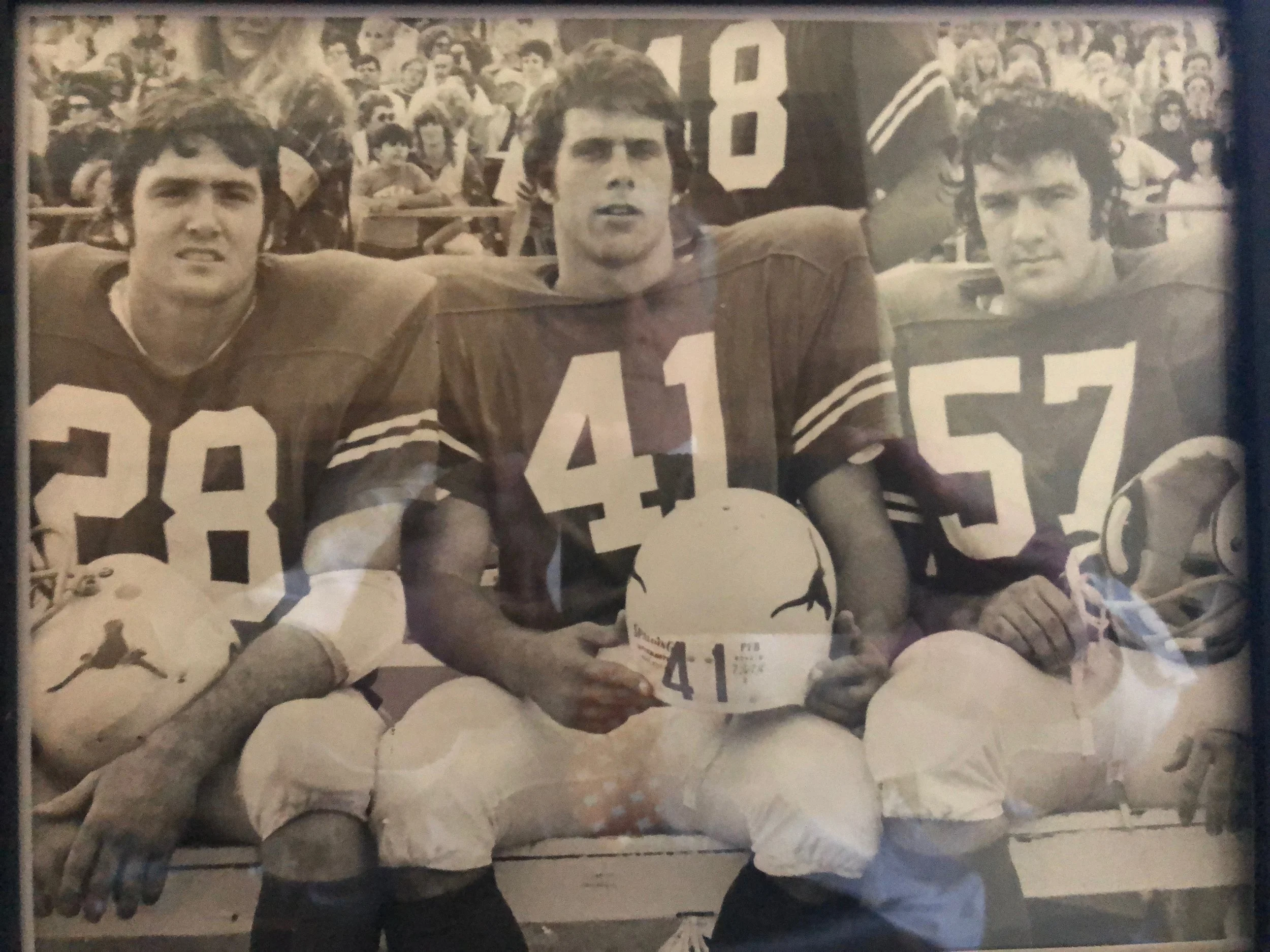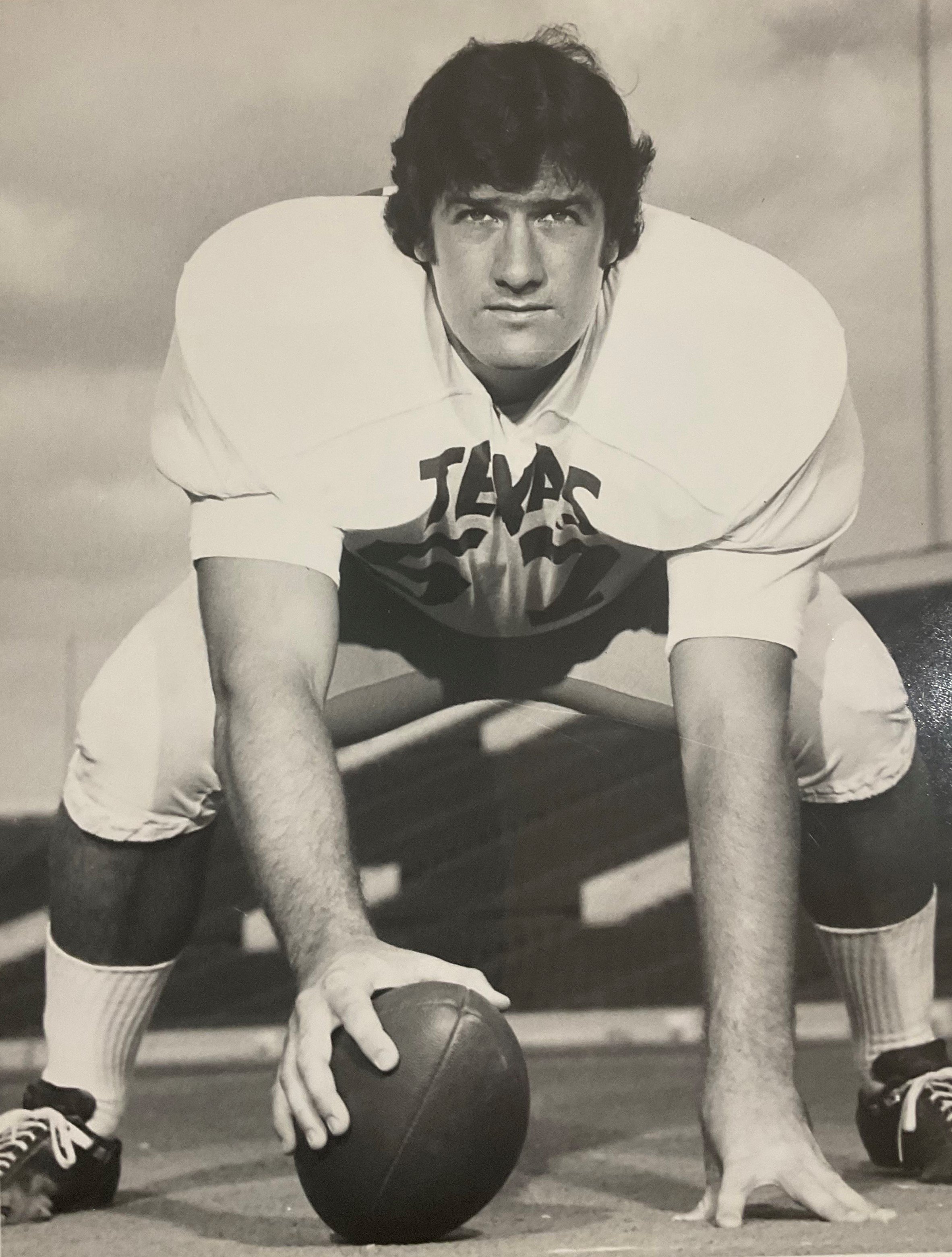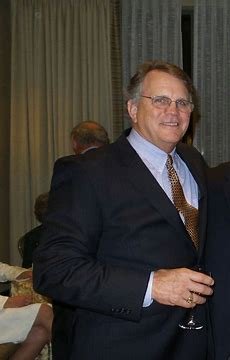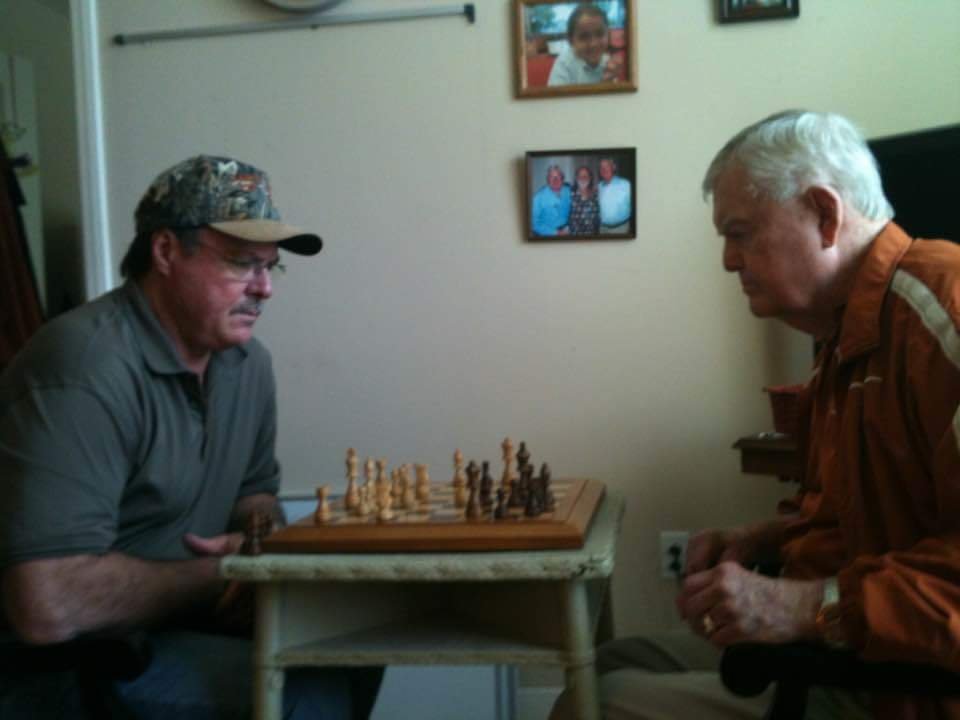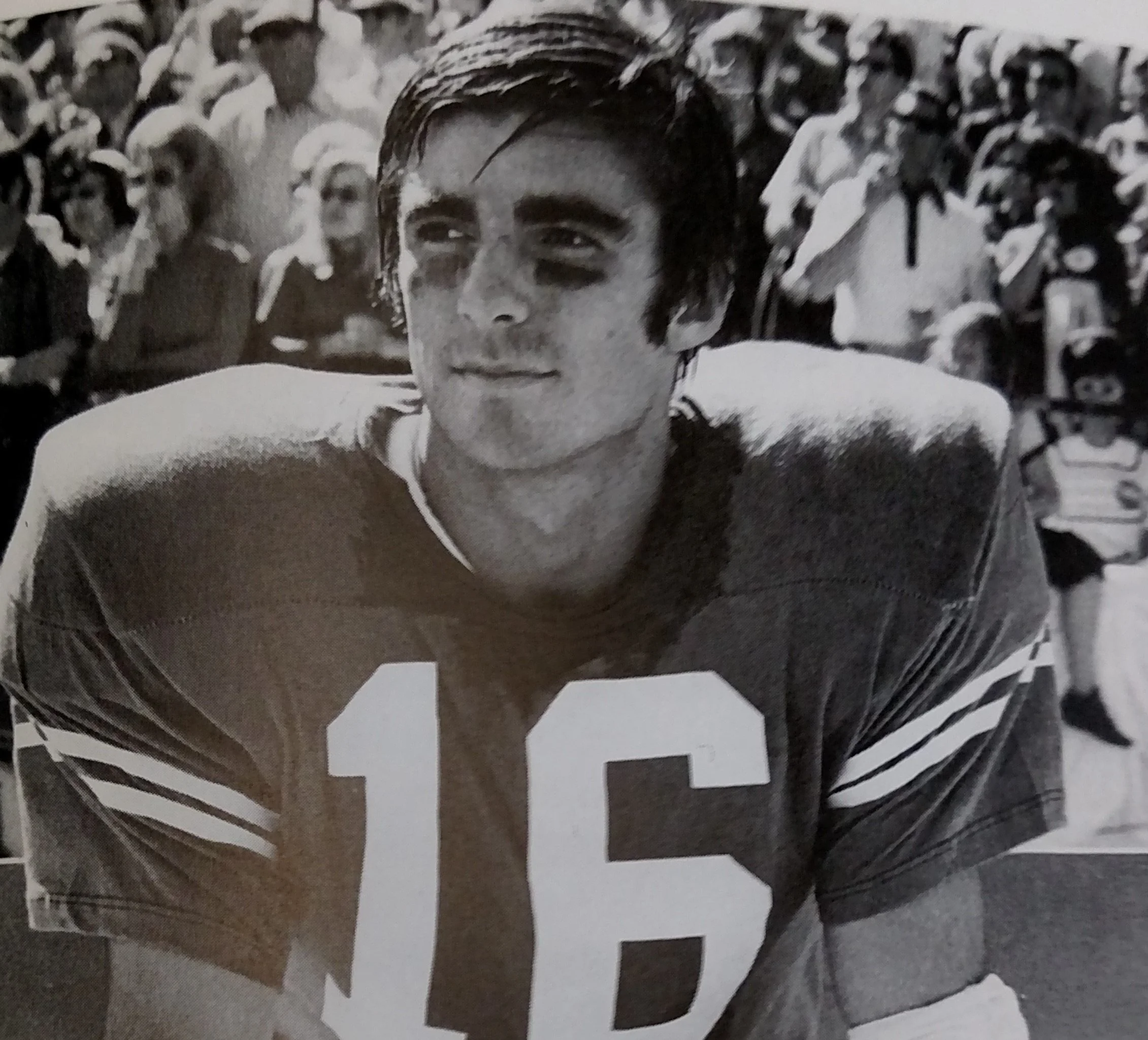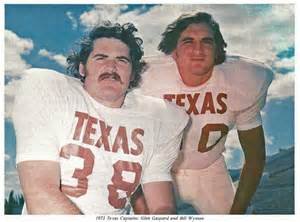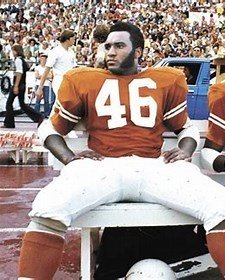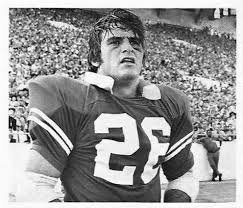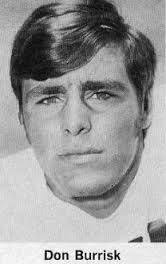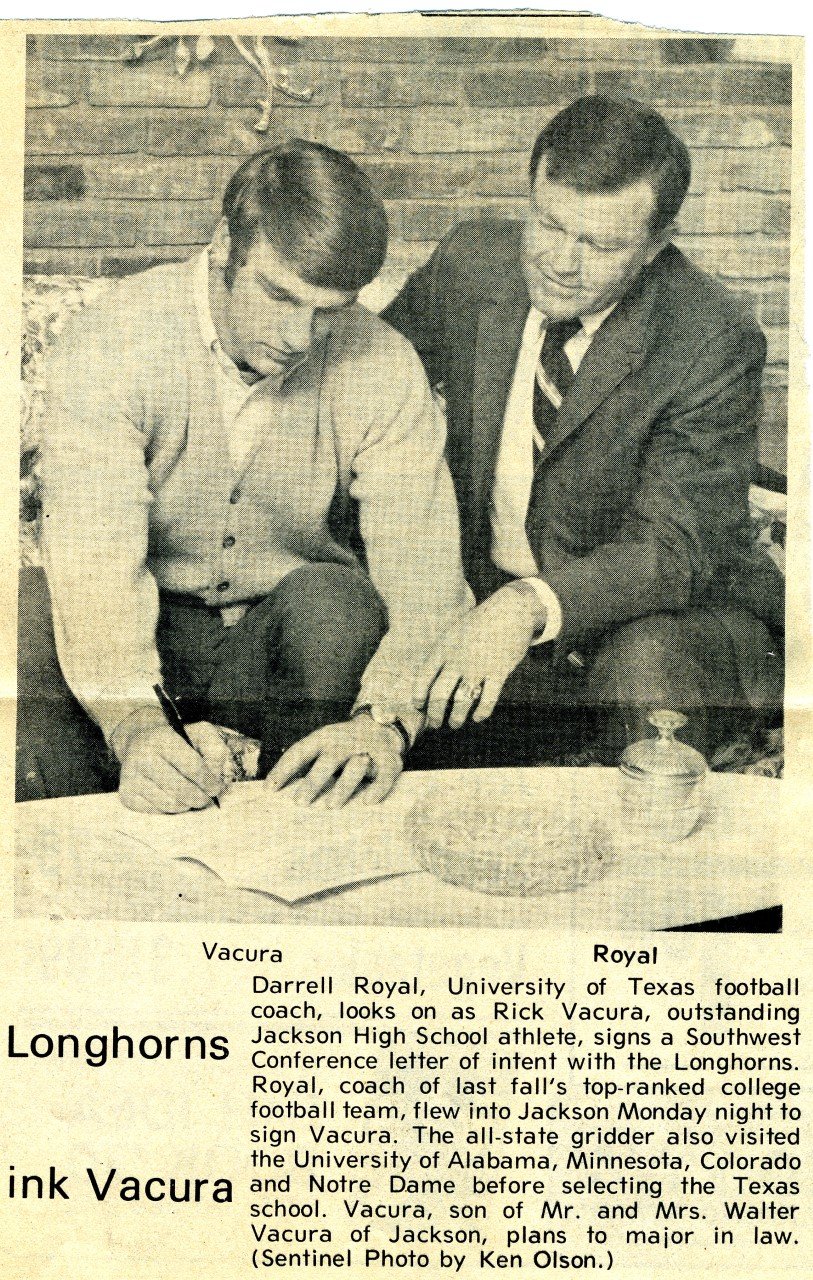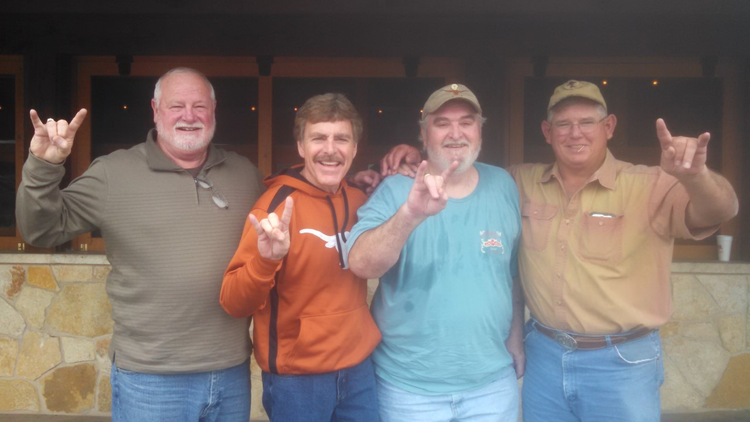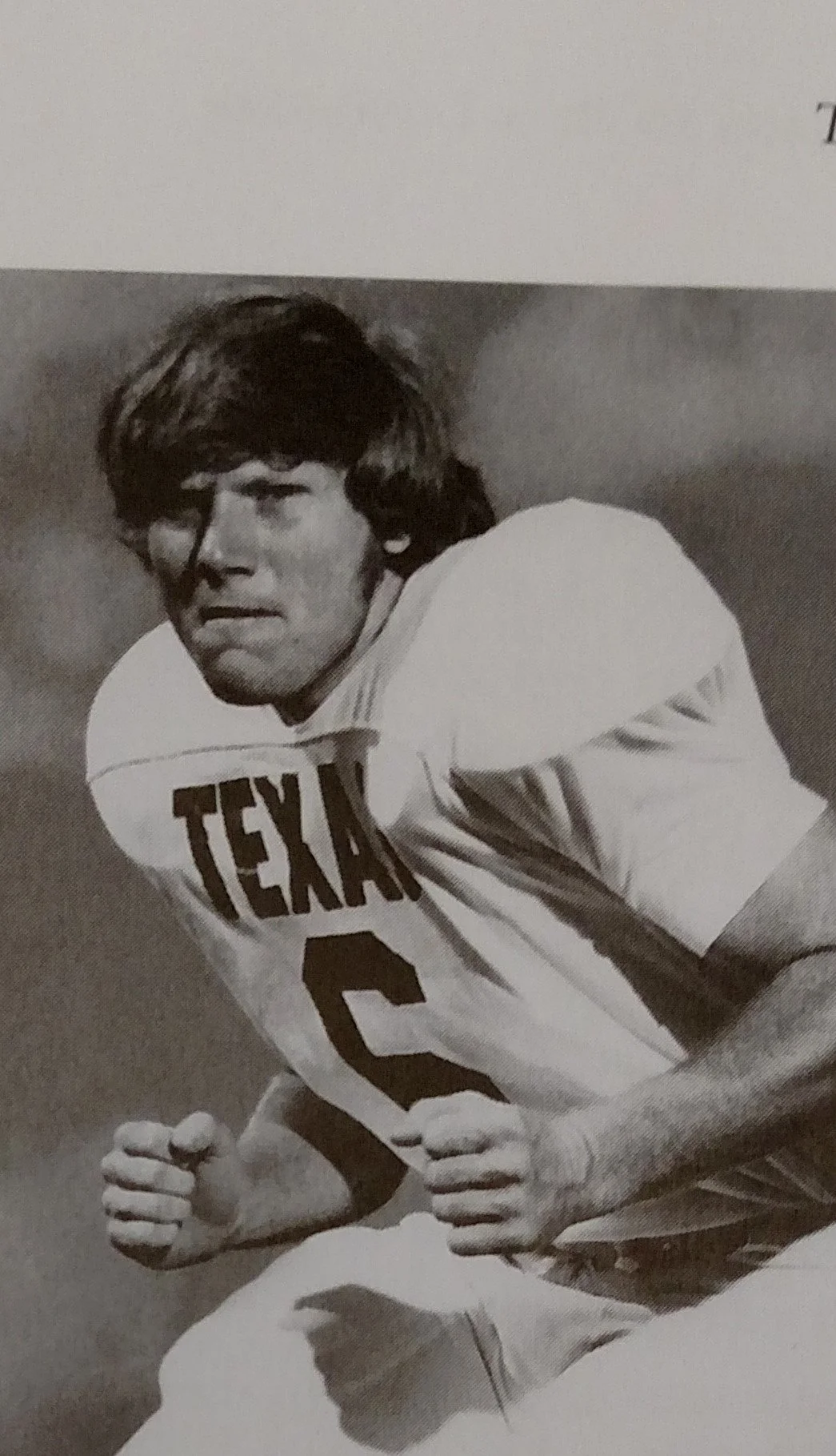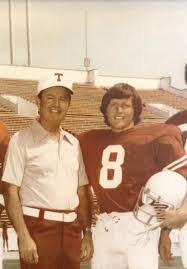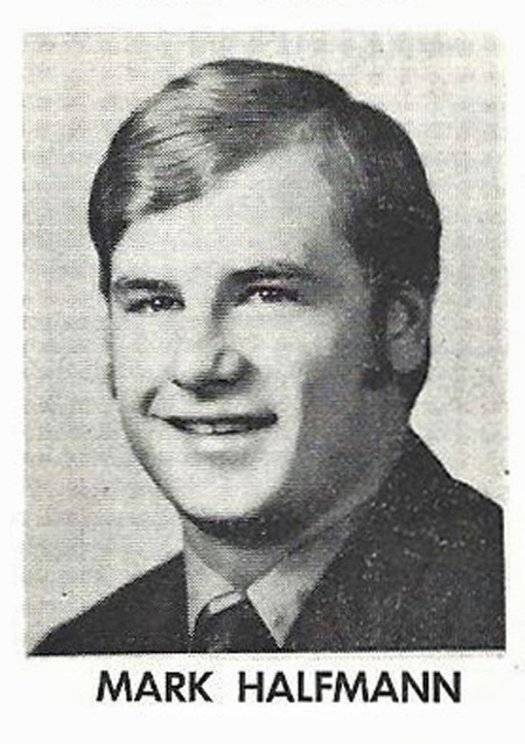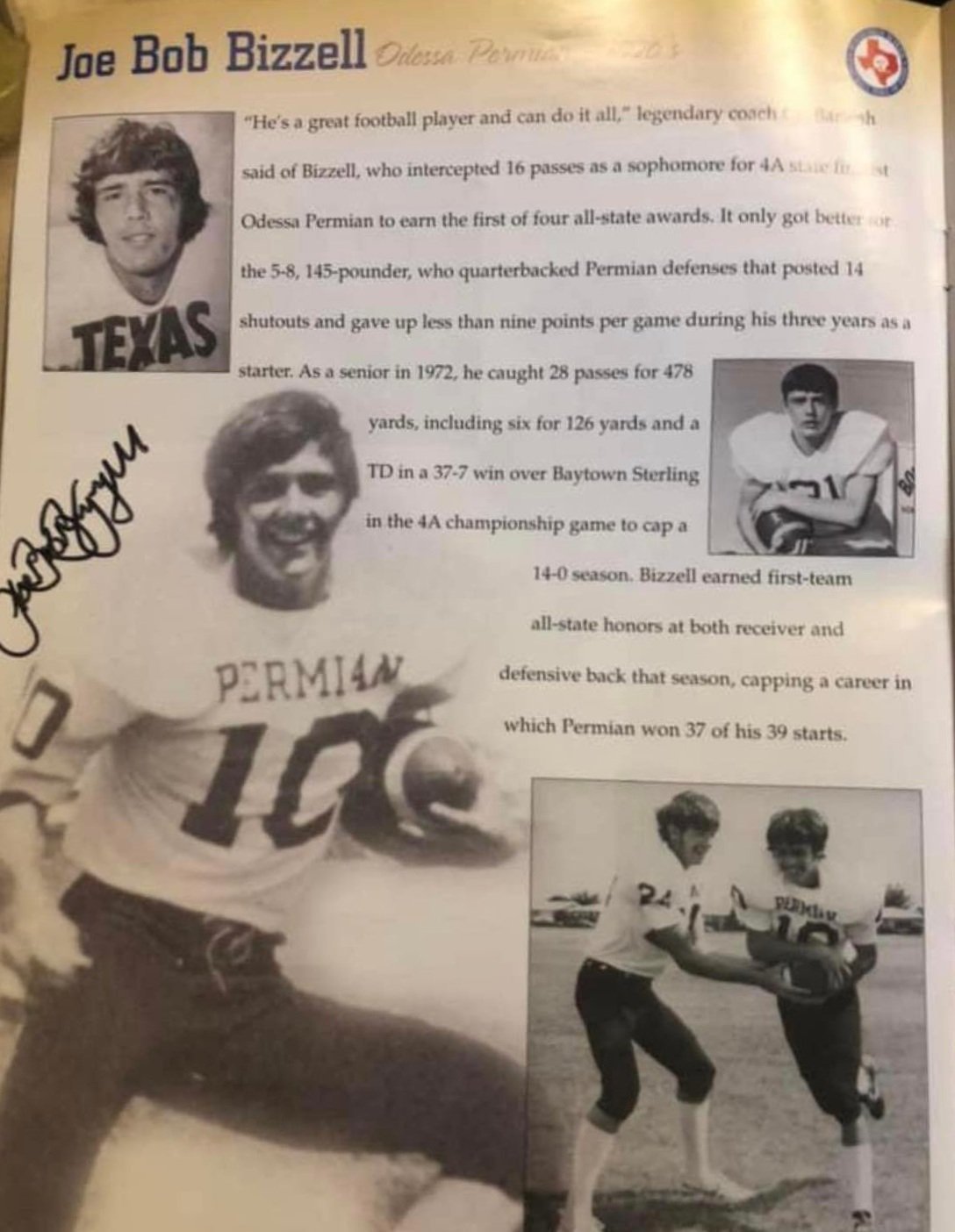THE LONGHORNS RING SIX TIMES
by Larry Carlson
August 2022 Larry Carlson, Rodney Tate, and Lance Taylor
It has been fifty autumns since the Texas Longhorns capped the longest era of dominance in Southwest Conference annals. Coach Darrell Royal's teams -- featuring the wishbone offense and swarming defenses -- won six straight SWC trophies,
1968-1973.
The incomparable soul singer, Marvin Gaye, recorded a classic track called "Trouble Man" near the end of that burnt orange reign, singing a particularly haunting line: There's only three things that's for sure...taxes, death and trouble...this I know, baby, this I know."
What does that have to do with UT football?
For their seven SWC foes back in the day, maybe Marvin should have swapped out TEXAS for taxes. The Longhorns were trouble aplenty, every year, for their conference opponents.
So dominant were those UT teams that they lost a conference game only twice, in '68 to Tech and in '71 to Arkansas. The incomparable Worster Bunch, the signing class of '67, finished their three varsity seasons with back-to-back national titles in '69 and '70.
The coaching at Texas was excellent and it was intense. Safety Gary Yeoman offered this wry observation about legendary defensive boss, Mike Campbell. "Bloody Mike was hypercritical of his own kids (Tom, Mike and Rusty)...and he treated the rest of us like family. too."
"Coach Royal hired no-nonsense people," concluded Yeoman -- who as son of legendary U of H
Head Coach Bill Yeoman.-- knew a little about good, tough coaching.
The pressure was on for the standout class of spring 1970. They would soon be held accountable (along with the signing groups of '68 and '69) to keep the conference crowns coming. While the varsity Horns went 10-0 that fall of '70, the freshman squad of Shorthorns posted a perfect 5-0 mark.
Though that signing class of '70 would not again be perfect, they would be instrumental in a fourth straight SWC championship in '71. The '72 team (10-1) made it five straight.
As seniors in '73, the Horns were the preseason number one team for Sports Illustrated. A Texas pennant and the "Hook 'em" sign adorned the early September cover. And that was in spite of the fact that Texas had no QB with more than a few snaps of experience. Unwarranted zeal?
The first four games resulted in a disappointing start that had fans cursing and soul searching. But talk now to the players who were part of the "roll six" title teams and they will, to a man, testify that their confidence in each other and the mission of winning another SWC trophy, never wavered. These Longhorns were groomed to win, and they all expected to prevail.
Behind a bulldozing line led by center Bill Wyman, FB Roosevelt Leaks rambled for 1,415 yards, a conference record. DKR regularly told reporters that Bill and Rosey went together like peanut butter and crackers, like ham and eggs. Texas had beaten the best Texas Tech team (11-1) in history before in the conference opener, and now UT responded to the sputtering 2-2 start -- both losses in non-conference play -- by torching its remaining SWC foes by an average score of
42-10. The Steers were back in tall cotton yet again. Dallas in January was a habit.
Nine Longhorns were honored as consensus All-SWC, including four "signing class of '70" seniors: Wyman, LB Glen Gaspard, DE Malcolm Minnick and DE-turned-DB, Jay Arnold.
For perspective, consider that since the Longhorns won the six straight rodeos -- a period that included two natties, 30 consecutive wins and a SWC mark of 40-2 -- the UT football program has managed seven outright conference titles. In 50 years.
When I recently asked Jay Arnold, who made that challenging metamorphosis from starting DE to standout DB, in a few words, to describe the '73 unit that frosted the record-setting title cake, he grew thoughtful. He pondered the question and paused for a moment. "I've got two words," Jay said.
"Conference champions."
That was Texas in '73 For the sixth straight season. Like Marvin sang: Trouble, man.
FIFTY YEARS AGO IN FOCUS: The Last of 6 Straight SWC Titles ('73)
Five Longhorns -- Jay Arnold, Lonnie Bennett, Billy Schott, Bob Tresch, and Gary Yeoman -- take questions from TLSN's Larry Carlson
LARRY'S STORY:
TLSN: The Horns lost a lot of standout players -- Jerry Sisemore, Randy Braband, Alan Lowry, to name a few -- from the 10-1 Cotton Bowl champs of '72. But you had Bill Wyman, Roosevelt Leaks and a lot of defensive veterans....What was the mindset and what were the team's expectations for '73 during spring and fall practices?
Larry, "Your questions caused a stir so much that I woke up in the middle of the night and could not go back to sleep. It's hard to describe the impact that playing football at Texas had on all of us. So many working parts and personalities, trying to come together on a common goal."
--- Bob Tresch
TRESCH: We had an outstanding group of players, and although we lost some great ones like the ones you mentioned, we had great people coming in behind them. The quarterback would be the big question. Marty Akins answered the QB question, and Mike Presley was right there. We expected to do well and win the Southwest Conference. Never a doubt.
BENNETT: We had lost four games total going into our senior year. We thought we would win every game, particularly as seniors. It was our time. It didn't matter who had left. Next man up.
YEOMAN: Could we beat OU? That was it.
SCHOTT: We were excited and felt confident coming off of what most people considered an upset win over Alabama in the Cotton Bowl. I think everyone was comfortable with either Mike Presley or Marty Akins under center and with a good stable of backs behind a solid O-line, things looked promising on the offensive side.
Defensively, we seemed to be loaded with experience and talent.
ARNOLD: I really don't recall the expectations, except that we expected to win games.
TLSN: Y'all were ranked third in the preseason, and then Sports Illustrated declared Texas number one in its early September issue. Then the team visited Miami for the opener, had fumble-itis, and lost a 20-15 game.
Anybody remember thoughts or reactions on the plane back to Austin or the practice week for Texas Tech?
BENNETT: It was the game I was most disappointed with. If we played ten times, we would have won nine, and the loss would have to be a game with us beating ourselves. It was quiet on the plane. I couldn't believe or accept that we had lost.
YEOMAN: We had eight turnovers and didn't punt once the entire game.
Aboussie fumbled on the Miami ten without anyone touching him.
ARNOLD: We had handily beaten Miami in Austin the year before and expected to win that game. And we should have.
TRESCH: It was a great disappointment. We knew of the jinx of SI but we lost anyway. It was especially hard to lose a game you should've won. Coaches don't give a team time to dwell on the loss. We had to get ready for Texas Tech and they always played us tough.
YEOMAN: I don't remember the plane ride back.
SCHOTT: All in all, it was a trip to and from Hell and we were glad to get out of there and back home alive. Not a fun plane ride home… (For the rest of Billy’s story on the Miami and OU game, visit the link 1973 SCHOTT REMEMBERS MIAMI AND SMU GAMES (squarespace.com)
TLSN: After the win over Tech and a 41-0 cruise over Wake Forest, y'all went into the OU game having lost the last two in the series after DKR had won 13 of his first 14 against the Sooners. It was Barry Switzer's first year as head coach and his key summer hire was Jim Helms, a Texas assistant and former UT player.
For the readers' background: What unfolded was a shocking 52-13 loss to OU after UT trailed 7-6 in the second quarter. When Texas stacked the box, OU hit 3 TD bombs and averaged 38 yards on six completions. It's been well chronicled in the History of Longhorn Sports pages (texaslsn.org), that one player stood up the next day in a Sunday team meeting when Royal said the team had quit. Bill Little of the UT Sports Information office wrote that the player said the following:
"That's not right, Coach. They changed everything we had prepared for. We played as hard as we could...we were going full speed to the wrong places,"
According to Little, Coach Mike Campbell backed him. "He's right, Darrell. They seemed to know everything we were doing before we did it."
I guess that poured gasoline on the cheating allegations against OU, but whatever it did, it also ignited you Longhorns, who then quickly began to jell. What are the recollections from the OU fallout and the 2-2 start?
SCHOTT: The OU game was embarrassing. Hardly any of us had ever had that many points scored against us at any level. Offensively, our fate was sealed with another five-turnover game, three picks and 2 lost fumbles.
TRESCH: The OU loss by such a margin was a shock. Cheating added fuel to the fire but didn't ease the pain. We had to move on.
YEOMAN: I don't think we could've beaten them anyway.
BENNETT: Talent-wise, it should have been much closer. But, looking back, I'm not sure we could've beaten OU our junior or senior seasons. I thought they had more talent than anyone in the country, but they were always on probation. When you have Greg Pruitt, Joe Washington, and the Selmon Brothers, you're in for a tough day.
ARNOLD: I don't think the rest of the story on that game has ever been chronicled. The game was passed off as "Russian disinformation" or sore losers, and Coach Royal's complaints about cheating were never fully investigated.
Side note Jay tells the whole story at the link JAY ARNOLD AND THE 1972-1973 OU GAMES (squarespace.com)
TLSN: After OU, your team then won the last six regular season games by an average score of 42-10. That was like a flashback to the national championship years of '69 and '70. Roosevelt Leaks was unstoppable, and the defense and special teams were stellar. What were the keys to the bounce back, and how gratifying was it?
TRESCH: A slow start wasn't on our minds. We knew we could win out the rest of the games. We just needed to play up to our potential.
SCHOTT: We woke up after a slow first-half start against Arkansas and wound up cruising to an easy 34-6 win. Rosey had two long runs, Jim Moore returned a punt 73 yards, and Raymond Clayborn put the dagger in the Pigs with an 85-yard TD sprint, but I think the real turnaround came the next week at SMU…during halftime.
(See more of Billy Schott's recollections at 1973 SCHOTT REMEMBERS MIAMI AND SMU GAMES (squarespace.com) )
YEOMAN: Well, we weren't playing the same caliber teams as OU and Miami.
BENNETT: We had always been winners. Why should this year be any different? It was pretty easy for me to believe we'd win out.
ARNOLD: I think the turnaround was largely due to Coach Royal's team meeting.
We had lost two games. We should've beat Miami in spite of all our turnovers because, as a defense, we should've stopped Miami's last drive, and we didn't.
Coach Royal called us to the middle of the field before the practice on Monday after OU, and told us he took the blame for the losses. He confided that he felt like he had just been "going through the motions at practice and not having any fun."
He said he wanted to change things up, and he said he wanted us to join him the rest of the season and "just go out and have fun and see what happens."
I believe that turned things around.
I think Coach losing his daughter (Marian Royal Kazen died after an April auto accident) had really taken a toll on him and he wanted to turn things around.
And, for the team, he did.
I recall that Pat Kelly, a really good receiver for us, started saying, "Good day! Let's have a good day today." He became known as "Good Day Kelly" and pepped us up.
Good Day Kelly
We had beaten a great Texas Tech team with Joe Barnes at quarterback. That year, Tech lost only once (the Raiders finished 11-1 and were Gator Bowl Champs) and that was to us in Austin.
Winning the rest of the conference games (and the SWC title) was a "Good Day."
TLSN: Y'all finished off the regular season with a 42-13 ass-kicking of the Aggies in College Station. It was UT's sixth straight lopsided win over A&M. How special was it to always whip the Aggies?
SCHOTT: Beating the aggy is always special and will forever remain a fond memory.
ARNOLD: Our class of 1970 freshmen played at Kyle Field three times in our tenure...our freshman year and then our soph and senior years on varsity. To win at Kyle Field on Thanksgiving was extra special. And to never lose to them was special, too.
YEOMAN: Aggies? I rest my case. They had a punt returner fair catch a punt on their own one-yard line. Not too bright.
TRESCH: Beating the Aggies was always a highlight. They had a lot of talent that made it interesting.
BENNETT: Beating them was never going to be a problem. I knew we would find a way to win, and they would figure out how to lose. Maybe I’m biased.
TLSN: Who were some '73 Longhorns you most admired for their ability, their intensity or their leadership?
YEOMAN: (Glen) Gaspard, (Doug) English and (Jay) Arnold.
SCHOTT: There are many, but off the top…Roosevelt Leaks had a quiet strength, leading by example more often than not.
Wade Johnston came from tiny Agua Dulce (Class A) in South Texas and established himself as another guy who fought his way up the depth chart without fanfare or calling attention to himself.
Pat Kelly was always a pleasure to be around and was one of the most positive teammates to have in your corner.
Glen Gaspard was a junkyard dog who inspired us with his passion and his love of just blowing people up.
BENNETT: (Rosey) Leaks, (Bill) Wyman and Gaspard. Not what they said, but the effort they gave.
TRESCH: I'd agree that Gaspard and Wyman were the most physical if you're talking about the seniors. But I could give you a number of players that gave it their all and did an outstanding job. All the players on this (panel) were going to give you 100 percent on every play. Made the rest of us want to play up to their level.
ARNOLD: Injuries played a big role in team performance. Losing guys like running backs Dennis Ladd and Don Burrisk to injuries...losing Rick Vacura in his first and last spring to a terrible knee injury and surgery was a great loss of talent.
Lonnie Bennett played with a bad hamstring but did a great job, running and blocking. Rick Davis had several back surgeries and still had a great career.
Fred Currin suffered injuries. Bill Walker really stood out but again, his injuries required surgeries, like Ladd, and Burrisk.
Mark Halfmann, Don Burrisk, Dennis Ladd, Bill Walker
Jimmy Walker, from Newton, was very impressive at running back but also had serious injuries. Bill Rutherford and Malcolm Minnick at ends were really good.
Keith Moreland
We lost great D-backs. Tommy Keel had a neck injury and Keith Moreland decided to concentrate on baseball and become, in my opinion. one of the best UT talents in the Big Leagues. In '73, there was the emergence of talent like Raymond Clayborn and Lionell Johnson, who you could tell had special skills.
Our middle core on defense had Doug English and Glen Gaspard who were as good or better than anyone in the country, and guys like Greg Dahlberg, Bruce Cannon, Fred Currin, Bill Walker and Wade Johnston, that were solid as rocks.
Of course, on offense we had two All-Americans, Wyman and Leaks. There weren't enough superlatives to describe them. When it was third or fourth and one, I wanted Rosey to carry the ball because I knew he would get the first down or the touchdown.
TLSN: Name one '73 teammate you'd call the toughest guy on the team. And who was the wittiest or the guy who kind of lit up the locker room or the dorm?
YEOMAN: Gaspard was the wittiest, "Chico" Tresch was the toughest.
Or, maybe the other way around.
SCHOTT: One of the toughest guys, pound for pound, was my Reagan High and UT teammate, Tommy Keel. He had no qualms about sticking a guy who outweighed him by a ton. Also one of the smartest people I’ve ever known. I think he scored about 50,000 out of 1600 on the SAT..
Fred Sarchet with Royal
Fred Sarchet was another slightly built dude who never shied away from contact. Great football IQ and a leader on and off the field.
Funniest guy ever had to be the late, great Big John Boecker from Seguin. He was 6’7”, 310-plus ….he kept us constantly laughing at practice, in the dorm, dining hall, classrooms, you name it.
Miss that guy so much…🙏🏼
ARNOLD: I'd have to pick Roosevelt as the toughest on offense, as he got hit every time the ball was snapped. Wyman was at the top and (OG) Bruce Hebert was solid also on the O-line. On defense, I'd have to say English, Gaspard, Bill "Frog" Walker and Yeoman were the toughest. "Yo" always had blood coming from somewhere on his face but didn't whine about it.
I'd have to nominate Bob Tresch and Bobby Giles for humor in the dorm and locker room. They never seemed to have a bad day. And the same for "Good Day" Kelly.
BENNETT: (Fullback) Dennis Ladd was one of the toughest individuals I've ever met. Tommy Isbell was the funniest.
TRESCH: Bill Wyman, Jay Arnold, Doug English, Roosevelt Leaks and Glen Gaspard. Most were leaders by how they played the game, and they didn't have to say a lot. That Jay Arnold guy was more vocal in addition to his play. He had a lot to say and didn't hold back. I think he's still the same.
TLSN: The Attack Team guys were all highly recruited guys and contributed heavily to UT's success, whether they ever got to see much game action or not. Who are a few guys you might recall as key players among the Attack Team and why they meant so much?
TRESCH: Darrell Gray went full speed to the point that he got playing time. I can't say enough about the Attack Team. They worked as hard as anyone, being as they had to stay and practice after the first and second teams went in. Obviously, they were talented athletes but due to an injury or size or getting moved to a strange position kept them from playing more. There's the same bond with our teammates no matter how much you played. We all went through the same workouts.
BENNETT; I concur with Bob and would add Tommy Isbell and
Mark Halfmann.
ARNOLD: The unsung heroes were on the Attack Team, guys that were great athletes. Bobby Giles, Mark Halfmann and Tommy Isbell come to mind. They were dedicated and made everyone around them better.
As Randy Braband told (legendary Dallas writer) Blackie Sherrod, when asked who was the best center in the conference aside from Wyman, Braband, without hesitation, said it was Mark Halfmann on our Attack Team. Isbell could play quarterback, running back, wide receiver, rover and defensive back, and do it well.
YEOMAN: I just remember that our kickoff guy, Mike Dean, would kick a lot out of the end zone, and that meant you didn't have to run all the way down there.
SCHOTT: The “Bluebirds” were such an integral part of game preparation and I was honored to be invited down to Coach Campbell’s end of the field to don the blue jersey and run pass routes along with Rusty Allen and Mike Arias. Walter “The Blade” Rowan was a good QB for us, simulating the opponent’s quarterback.
TLSN: Gotta ask this. Joe Bob Bizzell came in for '73 as a three-time All-State DB from Odessa Permian, in spite of being 5-8 and weighing about a buck-forty-five. He became the first freshman to start for Royal and had a good season but got dismissed from the team by Royal in summer '74. Joe Bob has now been inducted into the Texas High School Football Hall of Fame but he hasn't consented to an interview with The History of Longhorn Sports. How would you characterize his play as a Longhorn, and his personality?
The nickel back on our All Name squad was the first player to start as a freshman for Coach Darrell Royal. There are bound to be thousands of guys across Texas who wear snap shirts and boots and answer to the patented Lone Star name of Joe Bob. But there was and is only one Joe Bob Bizzell. The pint-sized defender (5-8, 145) packed an outsized punch and was All-State three seasons at Odessa's Permian High before wearing the burnt orange. He's a member of the Texas High School Hall of Fame.
YEOMAN: I never hung around Joe Bob. But he played his position well.
ARNOLD: Joe Bob was a tough player and a good guy. He was like a yellow jacket wasp. He would sting hard. He worked his way into a lot of playing time as a freshman. I never knew why he departed the team the next year.
SCHOTT: Joe Bob was an interesting cat…very athletic and seemed a bit shy on one hand and a little crazy on the other. He never seemed to care that his height or weight was less than some of our trainers and managers…he just liked to mix it up with the big boys.
TRESCH: I don't have much to add about Joe Bob except I Iiked him.
Billy Dale:- I had lunch with Joe Bob two years ago in Odessa, and he shared his story about what happened. Bottom line Royal asked Joe Bob to leave the team, and he did. Fifty years later Joe Bob still has sadness and regrets over the mistakes made. I asked him for an interview, but he declined.
TLSN: Six straight conference championships from 1968-73. It's been 50 years now and only OU (unfortunately) of 2015-2020 in the Big XII has duplicated that remarkable feat. What does it mean to you now?
YEOMAN: I didn't know that. I think we just assumed we'd win all the conference games. Our three years were just a copy of what our freshman class saw as the norm before us.
BENNETT: It's a nice footnote to our story as a class and for individuals to have a place in UT's football lore. Our group was a major contributor to three of those championships. I'm not sure any future UT teams will be able to equal that.
SCHOTT: It's quite an accomplishment, and I'm proud to have been a part of that run of success.
ARNOLD: Continuing the winning ways after the Worster Bunch recruits was special. Growing up, the term "Southwest Conference champions" meant something to me. Being on three SWC championship teams meant a lot then and now. To be a small part of upholding the last three of six in a row, in spite of a few losses and key guys suffering injuries, was a proud accomplishment.
TRESCH: I think the meaning of our playing time at Texas evolves over the years. It continues to grow past the playing field. It was a great honor to play at Texas.
TLSN: To toast to the memories connected with the three SWC titles, here's one more that I've just GOTTA ask: What were a couple of your favorite Austin hangouts to blow off steam and relax a little?
YEOMAN: The Bucket?
TRESCH: Luigi's, Flagon, the Bucket. Or wherever Yeoman was going.
He had the money.
BENNETT: Near the campus, the student union would have events given by Black social groups. Or I would go over to Huston-Tillotson, the Historically Black College, for entertainment and ladies.
SCHOTT; The Bucket, Flagon & Trencher, Orange Bull, Luigi’s, Mother Earth, New Orleans Club, Vulcan Gas Company, Armadillo World Headquarters, Soap Creek Saloon, Split Rail.
Okay, that was more than a couple.


